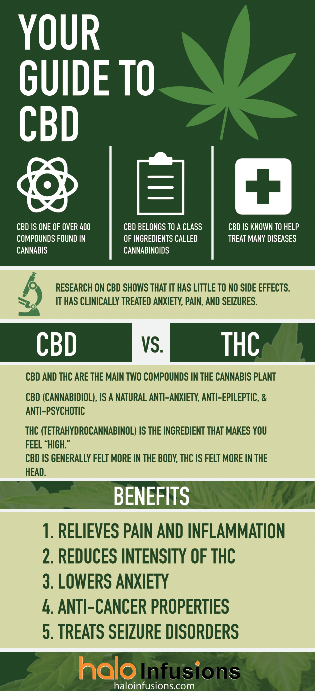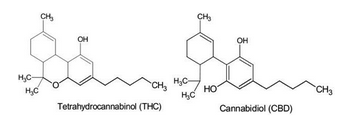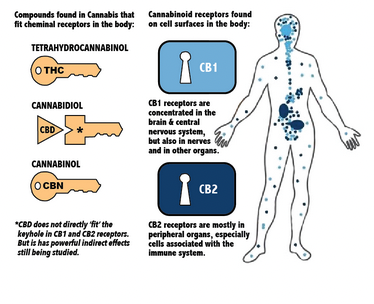THC vs CBD
 Tetrahydrocannabinol (THC) and Cannabidiol (CBD) are the two most abundant cannabinoids found naturally in cannabis (marijuana). There are over 100 distinct cannabinoids known to be present in the cannabis plant.
Tetrahydrocannabinol (THC) and Cannabidiol (CBD) are the two most abundant cannabinoids found naturally in cannabis (marijuana). There are over 100 distinct cannabinoids known to be present in the cannabis plant.
Classed as phytocannabinoids (versus endocannabinoids produced naturally by the body), both THC and CBD interact with specific cells in our brains, peripheral nervous system and internal organs, causing a number of different effects in our bodies.
Both THC and CBD have a wide range of applications and are similar at the molecular level. However, the chemical properties of THC and CBD vary widely.

THC
THC was the first phytocannabinoid that was discovered and has been much more extensively researched than CBD.
THC is strongly psychoactive and can be intoxicating even in small amounts. Consequently, THC can alter your behavior and cause you to lose some control of your faculties, properties that contribute to its recreational appeal.
Nonetheless, THC has desirable medical applications and has been shown to be effective as a moderate-strength analgesic (a type of drug that offers relief from pain) and an effective form of treatment for the symptoms of many diseases including AIDS, multiple sclerosis (MS), ALS, Crohn’s disease, epilepsy, cachexia and cancer.
Studies show that THC activates pathways in the central nervous system, which work to block pain signals from being sent to the brain. Likewise, cannabis has been shown to be especially effective against neuropathic (nerve-related) pain.
Post-traumatic stress disorder (PTSD) is another common reason to use medical cannabis. Recent studies confirm that oral doses of THC can help relieve a variety of PTSD-related symptoms including flashbacks, agitation and nightmares. Among its many other benefits, research has demonstrated that THC:
- Reduces nausea and vomiting
- Acts as an appetite stimulant in those with cancer and HIV-associated wasting syndrome
- Can stimulate weight gain in individuals with anorexia
- May improve breathing in asthmatics
- Reduces intraocular pressure and resulting symptoms in glaucoma sufferers
- Provides sedative effects – some strains induce sleep
- May improve night-time breathing and reduce sleep interruptions caused by sleep apnea
CBD
Both CBD and THC interact with cells within our bodies by activating the cannabinoid receptors that are responsible for transmitting signals, causing different physiological effects.
There are many studies showing CBD to cause only desirable and beneficial effects. In particular, CBD has also been shown to protect against the negative effects of THC, by mitigating the more intense psychoactive properties.
CBD is sometimes used to treat symptoms of anxiety and certain cases of inflammation. It has also been shown to be effective in treating a wide range of other ailments. For example, studies have shown that CBD can be used to treat epilepsy, nausea, multiple sclerosis, and numerous inflammatory diseases, as well as inhibit the growth of certain forms of cancer.
CBD has also shown promising results for numerous psychiatric disorders, including schizophrenia, bipolar disorder, anxiety disorders, and more. Research is still underway for many applications of CBD. But it is well established that CBD:
- Can have sedative effects
- Can increase alertness
- Decreases limbic system activity and social isolation
- Reduces anxiety in social anxiety disorder
- Protects against alcohol induced neurodegeneration
- Can treat convulsion, inflammation, anxiety, and nausea
- Can be effective in treating schizophrenia
- May be effective in management of levodopa-induced dyskinesia in a Parkinson’s disease patient
- Reduces growth and invasiveness of breast cancer cells
- Inhibits cancer cell growth by promoting apoptosis

Halo Infusions & Extractions
Web: www.haloinfusions.com
Email: info@haloinfusions.com
DISCLAIMER: Information provided is excerpted from sources including The National Institutes of Health, Mayo Clinic, WebMD, and other scholarly sources. This information is intended only to complement, not to replace or contradict, any health or medical advice or information provided by healthcare providers. Customers who